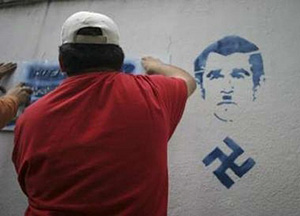 |
 |
 |
 Editorials | Issues | March 2007 Editorials | Issues | March 2007  
Bush Tours Latin America, No Longer US Backyard
 Laszlo Trankovits - Deutsche Presse-Agentur Laszlo Trankovits - Deutsche Presse-Agentur


| | A protester spray-paints a wall during a demonstration against U.S. President George W. Bush upcoming visit, in Guatemala City March 3, 2007. (Reuters/Carlos Duarte) |
US President George W Bush's longest Latin American trip, which begins Thursday, has a clear goal: to decrease the threatening influence of Hugo Chavez.

The Venezuelan president recently has missed hardly a chance to demonstrate his deep animosity for the "imperialist" United States and its president. He received Iranian President Mahmud Ahmadinejad, a fellow US adversary, with open arms in Caracas, and at September's UN General Assembly he referred to Bush as "the devil" and joked that the US president had left behind a sulphurous odour on the podium.

Bush knows it will not be easy to present himself as a credible friend of Latin America while touring Brazil, Uruguay, Colombia, Guatemala and Mexico. Countries south of the US traditionally are shaped by a deep distrust toward the rich and powerful US and its world dominance. Five years of neglect toward Latin American policy during Bush's global war on terrorism has only deepened those resentments.

Six years ago, Bush raved about the American century, describing his vision of a prosperous, unified hemisphere from Alaska to Tierra del Fuego.

Since the September 11, 2001 terrorist attacks and the wars in Afghanistan and Iraq, however, Washington has done little to follow Bush grand idea with action. The only mitigating factor might be US economic aid to Latin America, which has increased from 862 million dollars in 2001 to a proposed 1.7 billion dollars for 2008, according to State Department data.

Members of Congress blame Bush for the neglect of Latin America that they say has contributed to a leftward shift across the entire region, an intensified anti-US climate and growing economic polarization.

"The reason we are having problems in Latin America is because we have not focused, we've turned our attention away," Representative Connie Mack, a Florida Republican, was quoted by a Florida newspaper as saying.

Bush's six-day trip is meant to send a message his government values Latin America. The administration carefully selected capitals with more moderate governments and leaders in whom the US sensed growing unease with Chavez's stridence and pretence of power.

Numerous top US government officials, including Commerce Secretary Carlos Gutierrez, Homeland Security Secretary Michael Chertoff and top US diplomats have travelled in recent weeks to Mexico, Brazil and Argentina to assure those governments of their importance to Washington.

Bush is also seeking a foreign-policy success in Latin America, something that has eluded him in the Middle East.

The US wants to suggest an ecological alliance with Brazil that would make the US less dependent on Venezuelan oil. To that end Bush and Brazilian President Luiz Inacio Lula da Silva are expected to sign an agreement on the joint production and marketing of ethanol fuel made from sugar beets. In Uruguay, an agreement over the liberalization of trade is on the agenda.

In Colombia, which receives a large sums of financial support from the US, Bush will meet hardline President Alvaro Uribe, who accuses Venezuela of supporting leftist guerrillas active in Colombia. Bush will meet with like-minded leaders when he sits down with Guatemalan President Oscar Berger and Mexican President Felipe Calderon, both of whom have shown little patience with Chavez's antics.

Washington fears, however, that street protests in Latin American cities will distract from the trip's economic themes and common issues to be discussed during Bush's visits. | 
 | |
 |



